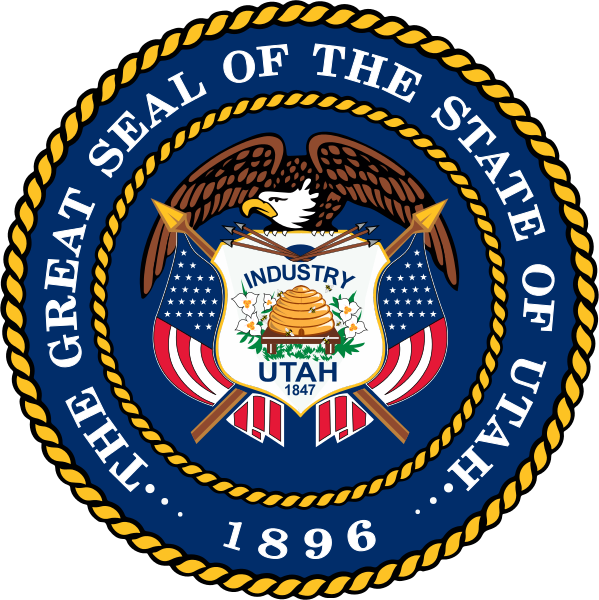EDWARD PAYSON FERRY.
A life of intense and carefully directed activity brought Edward Payson Ferry to a prominent position in mining and financial circles in Utah, to which state he transferred his labors in 1878, settling in Park City. He was born April 16, 1837, at Grand Haven, Michigan, being a son of William Montague Ferry, who was sent as a missionary to the Indians at Mackinac Island by the Presbyterian church and afterward became one of the first settlers of Ottawa county. Michigan. The work of Christianizing the red men was a difficult task. Unacquainted with any of the customs of civilization, it was necessary to instruct them along such lines before the higher teachings of Christianity made any impression upon them. Rev. Ferry, however, educated his Indian wards in the ordinary branches of English, so that they became able to read and thereby grasp some understanding of the teachings of the bible. In fact it was said that "in time the Indians were so grounded in the language and in the doctrines of Christianity that some of the better educated ones were sent to other Indian tribes to do for those tribes what had been done for them." The mission established and conducted by Rev. Ferry was one of the most successful ever sent out by the Presbyterian church and its influence was long a potent factor among the red men of that section of the country. Edward Payson Ferry was thus reared upon the western frontier, his youthful days being passed in Ottawa county, which borders Lake Michigan with a splendid natural harbor at Grand Haven. Michigan at that time was largely a lumber state and Edward P. Ferry, turning his attention to commercial interests, became an active factor in the lumber trade, owning and operating sawmills and making large investments in timber lands. His business grew to extensive proportions and in order to further facilitate his interests in the matter of transportation he acquired a line of lake steamers. Eventually he also extended his efforts into the field of banking and became the president of the First National Bank of Grand Haven. Studying closely business conditions affecting not only his immediate locality but the entire country, he became impressed with the mining possibilities of the west and in 1878 made his way to Park City. Utah, that he might personally supervise investments made for himself and business associates. He became owner of important mining properties secured through prospecting and purchase. Many of his properties proved great producers of wealth and he became one of the chief owners of the Silver King Coalition Mines Company and had other extensive and important mining interests. He likewise continued his connection with banking circles as a large stockholder in the Walker Brothers bank and in the Utah Savings and Trust Company. He made large investments in real estate in Salt Lake and in all business matters displayed notably sound judgment, discriminating readily between the essential and the non-essential in all business affairs.
In 1870 Mr. Ferry was united in marriage to Miss Clara V. White and they became the parents of five children, one of whom has passed away, while those living are: William Montague, now mayor of Salt Lake; Edward Stewart: Mrs. Miriam Reynolds; and Mrs. Edith Merrill. The two sons, following the retirement of the father from active business, assumed the management of his interests and have remained prominent figures in the business life of city and state.
Mr. Ferry always gave his political support to the republican party where national questions and issues were involved and at local elections supported the old liberal party. He was one of the first representatives of that party in the state legislature. He was also active in organizing the Trans-Mississippi Congress and was elected to its presidency in Denver in 1891, making a most capable officer in that position. He belonged to the Alta Club, was made an honorary member of the University Club and in Masonry he attained the Knight Templar degree. He greatly enjoyed the amenities of social life and never allowed outside interests to so monopolize his time that he had no opportunity for the joys of friendly companionship. His activities were ever of a character that contributed to public progress and prosperity as well as to individual success, and Utah profited much when she gained Edward Payson Ferry as a citizen.
 SOLON SPIRO.
SOLON SPIRO.
The history of Solon Spiro is the story of successful achievement in the face of many obstacles and difficulties, his career proving the fact that it is only under the pressure of adversity and the stimulus of opposition that the strongest and best in men is brought out and developed under circumstances which would have utterly discouraged and disheartened a man of less resolute spirit he pushed forward and won his place among Utah's capitalists, having devoted the greater part of his time in recent years to the development of the Silver King Consolidated mines and the western half of the Park City mining district.
He was born in Kurnik, Germany, March 1, 1863, a son of Leopold and Ernestine (Ascheim) Spiro, who always remained residents of that country. Their family numbered eight children, six of whom still survive, namely: Mrs Doris Oelsner, Mrs. Henrietta Greiffenhagen, Mrs. Hannah Sachs, Mrs. Meta Levy, Zerlina and Solon.
After studying in private schools of Germany and in business colleges of his native land until 1881, Solon Spiro came to America, a young man of eighteen years, at the request of his uncle, M. S. Ascheim, who was then engaged in mercantile business in Park City. He believed that business conditions of the west offered a future to his nephew and the latter eagerly availed himself of the opportunity. He became active in the management of his uncle's store at Park City and in this connection displayed marked ability and initiative. It was in this way that he laid the foundation for his present fortune. He remained an active factor in mercantile circles at Park City from 1881 until 1900 and then sold out to concentrate his efforts and attention upon mining, for he believed that the rich mineral resources of the west offered a still greater field for successful achievement. With the capital that he had acquired through his mercantile interests he made investment in mining claims and a little later began mining on a small scale. Most of his investments turned out to be money makers and his development of his properties gave him a thorough and comprehensive knowledge of mining and at all times he closely studied every phase of the business. At length he became organizer and president of the Silver King Consolidated Mining Company, the property of which at that time gave no outward evidence of its great riches. His discovery that a co-tenant had surreptitiously mined large quantities of ore from partnership ground led to a suit at law memorable in the history of mining litigation. Although he had pitted against him one of the wealthiest mining corporations and some of the best legal talent in the United States during a four-year struggle in the federal courts, Mr. Spiro matched brains and energy against money and influence and won. The judgment, with interest, amounted to something more than nine hundred thousand dollars.
This notable victory was for Mr. Spiro only a stepping stone in far-reaching plans for the up building of the Silver King Consolidated and the development of the western part of the Park City district. Under his administration the Consolidated became one of the heaviest producers and dividend-payers of Utah. To its original territory of forty-three acres property after property was added until the domain of the company embraced the greater portion of the virgin mineral territory in the western section of the camp-a territory whose resources, although well recognized, were not recoverable by ordinary methods of mining on account of the heavy underground water flow. The ultimate object of Mr. Spiro was to make the riches of this vast area accessible to the miner and, in 1916 he launched the greatest enterprise of his business career, a double-tracked tunnel to drain and open at depth the territory mentioned. This great bore, three miles in length, providing an outlet for a new mineral region, bears Mr. Spiro's name and would of itself entitle him to an honorable place among the builders of this western empire.
Mr. Spiro was united in marriage to Miss Ida Mae Marks, of Cincinnati, Ohio, whose vivacity and charm make her a social favorite not only in Salt Lake City, but in the eastern cities where she and her husband are frequently called by Mr. Spiro's extensive financial interests. He is affiliated with the Salt Lake Lodge, B. P. O. E., and holds memberships in the Criterion Club, City Atheltic Club and Automobile Club of America in New York City.
Mr. Spiro is a man who places a true valuation upon his own capacities and powers and recognizes his limitations, yet his friends say that the latter are extremely few. He also judges correctly of life's contacts and experiences and when convinced of the justice of his course, nothing can swerve him from the path which he marks out for himself. By reason of his abilities and keen perception he ranks with the leading mine operators and business men of the nation.
The information on Trails to the Past
© Copyright may be used in personal family history research, with source citation. The pages in entirety may not be duplicated for publication in any fashion without the permission of the owner. Commercial use of any material on this site is not permitted. Please respect the wishes of those who have contributed their time and efforts to make this free site possible.~Thank you!



